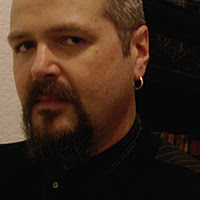We're freshly back from Springfield, Missouri, and our heads are still reeling.
I can't pinpoint it exactly. Perhaps it's because Winter is there already, cold, bleak and deathlike. Maybe there's a disgruntled political atmosphere after the country had the audacity to elect a black man for President (MO went for McCain). Maybe it's because we haven't had a vacation in a long time, and our tolerance was low.
Of course, waiting for a table at Lambert's in Ozark, just a few miles from the Arkansas border, and being the only interracial couple in a racially homogeneous room, might have had something to do with it. We felt... alien. More than usual. The evangelist-wife beehive mullets were out in force, as was the flannel and the camouflage trucker caps and the beer-sponsored racing event t-shirts. Bianca and I didn't hold hands the entire time we were in the state.
I was asked by a girl there "how is California different from here?" I had a hard time figuring out what to say, where to start. There are some similarities: Chain restaurants. Too many SUVs. Starbucks. Most of California isn't much different from Missouri. Cows, tractor supply, Wal-Mart, highways, homophobia.
But the differences--when speaking of Los Angeles--are vast. L.A. has sidewalks. Springfield's roads slope into ditches because of the rain. In L.A. you can stand in line at a bank and run out of fingers counting ethnicities. Springfield is overwhelmingly white. From L.A. you can drive 275 miles to Las Vegas. From Springfield you can drive 40 miles to Branson. L.A. has earthquakes and wildfires. Springfield has tornado warnings, heavy rainfall and hail. L.A. has parking for ten bucks, advertised by flashlight-waving men in red vests. Springfield has no lack of parking, including 60-foot spaces for 18-wheelers. L.A. has mountains and sometimes an ocean within view. Springfield has an open sky.
How do I explain the utter joy of the taco truck, silhouettes of palm trees in front of phone lines, the brute-force wizardry of shuttle bus drivers weaving through traffic? Techno music, Mini Coopers, thin women with large sunglasses and tiny dogs, goth-industrial clubs, reading books at vegan cafes, Dodger Dogs, homeless veterans at freeway offramps? Celebrity sightings, smog, the Sunset Strip, tattoo & piercing parlors, the Santa Monica Pier, graffiti? The Hollywood sign, the Walk of Fame, gang signs, West Hollywood, sushi bars, Pink's, the Melrose shopping district, police helicopters? Little Tokyo, Chinatown, Thai Town, Little Armenia, Olvera Street? I couldn't say much to her.
I usually regard Randy Newman's music with the correct amount of revulsion, but the song holds absolutely true for us. We love L.A. And we're glad to be back.
